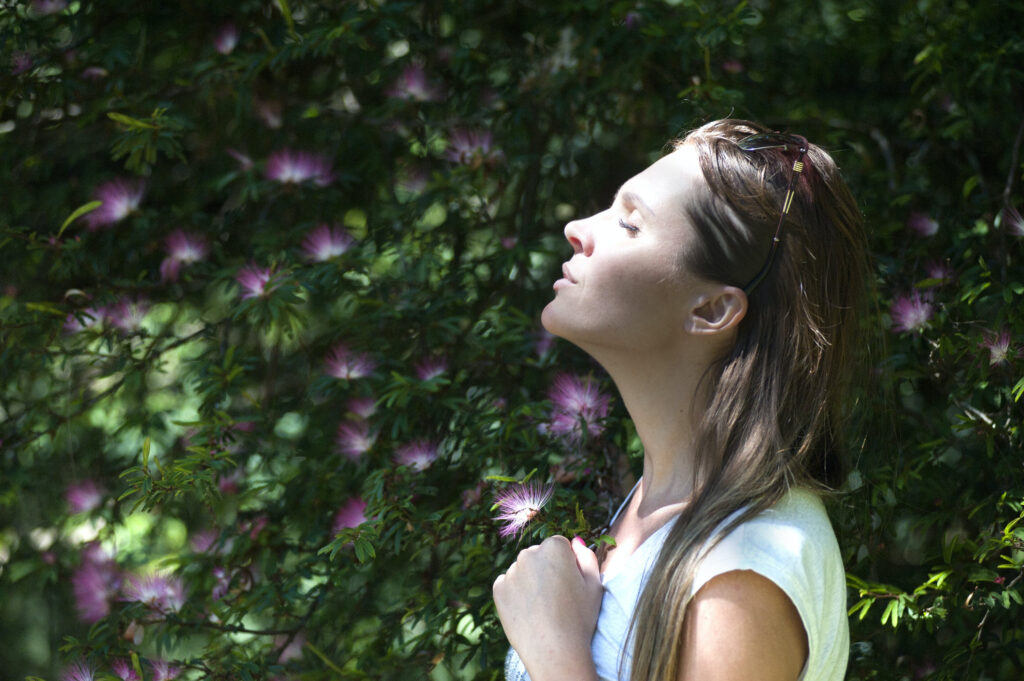
Hyperventilation syndrome acupuncture treatments ease anxiety, calm the sympathetic nervous system, and strengthen the lungs. Hyperventilation is defined as breathing more than metabolic requirements. It is associated with reduced arterial carbon dioxide, leading to respiratory alkalosis and physical symptoms including:
- Dizziness or lightheadedness.
- Shortness of breath.
- Chest pain and palpitations.
- Belching, bloating, dry mouth.
- Weakness, confusion.
- Sleep disturbances.
- Numbness and tingling in your arms or around your mouth.
- Muscle spasms in hands and feet.
Hyperventilation Syndrome
Hyperventilation syndrome (HVS) is a term that was initially used to provide a clinical diagnosis for patients presenting with disturbed breathing associated with diverse symptoms. Anxiety was a core component in the original description of HVS, but the relationship between hyperventilation and anxiety is not simple, and hyperventilation can occur without anxiety.
HVS is a controversial diagnosis, but it continues to be used by clinicians due to its pragmatic description. Physical therapy is one of the treatment options frequently offered to patients with HVS and generally consists of a combination of advice, education, and specific breathing retraining techniques (BR). However, it is unclear which components of the physiotherapy treatment are most effective for HVS.
Traditional and Adjunctive HVS Therapies
Healthcare providers are now beginning to explore hyperventilation syndrome acupuncture treatments as an adjunctive therapy in the management of HVS. A systematic review has reported that acupuncture has been used with success in patients with respiratory conditions. It is well documented that acupuncture influences centers within the brain (e.g., the limbic system), which could affect emotional factors. Acupuncture helps HVS by reducing the anxiety component of the condition.
Hyperventilation Syndrome Acupuncture Treatment
The aims of this preliminary, uncontrolled, randomized study were (1) to establish whether acupuncture could be an appropriate modality in reducing anxiety in the treatment of HVS when compared to standard physical therapy breathing retraining and (2) to establish whether a crossover design was appropriate for investigating the effects of acupuncture and BR.
The traditional Chinese medicine (TCM) approach with acupuncture involves using individualized treatment programs for each patient. That’s what we do at Raleigh Acupuncture. However, most physiotherapists are not trained in TCM, so the investigators of this study utilized a standardized point prescription. The acupoints included LI 4, LV 3, and ST 36. The researchers would have been better served by using PC 6 instead of LI 4, but they still got good results!
The practitioners used sterile, single-use acupuncture needles, inserting each needle into the acupuncture points. A deqi sensation (achy sensation) was elicited by gently manipulating the needles. Each participant was treated bilaterally and had a total of six needles inserted for 30 minutes.
Breathing Retraining Techniques (BR)
Therapists provided standard BR in the form of breathing control and relaxation techniques. Participants were taught breathing control by asking them to place one hand on their upper abdomen and to concentrate on abdominal movements. Then, they were instructed to allow the stomach to rise on inspiration and fall on expiration.
They were encouraged to slow the rate of breathing. Once this was mastered, participants were advised to continue this technique for as long as possible during the session. Participants were also guided through a relaxation session during this time. BR sessions lasted 30 minu
Hyperventilation Study Results
The results showed statistically significant treatment differences between acupuncture and breathing retraining, where acupuncture delivered superior results. Reductions were found in the HAD A (anxiety) and Nijmegen (symptoms) scores.
We find this to be the case with our hyperventilation syndrome acupuncture treatments. By targeting the lungs and heart, acupuncture reduces anxiety, eases palpitations, calms breathing, reduces shortness of breath, and strengthens overall lung function.
Acupuncture Relieves Hyperventilation Syndrome
This study demonstrates that acupuncture is beneficial in the management of HVS in terms of reducing anxiety levels and hyperventilation symptom severity. The investigators would have generated even better results by using more appropriate acupuncture points. However, even their basic treatment approach served to be effective.
Next Steps
BOOK NOW to schedule an appointment online.
Meet the Practitioners (Video).
Learn about all the conditions we treat.
Reference
Effects of Acupuncture as a Treatment for Hyperventilation Syndrome: A Pilot, Randomized Crossover Trial DENISE GIBSON, M.Sc., M.C.S.P.,1,2 ANNE BRUTON, Ph.D., M.C.S.P.,2 GEORGE T. LEWITH, M.A., D.M., F.R.C.P., M.R.C.G.P.,3 and MARK MULLEE, M.Sc., C.S.T.A.T.4, THE JOURNAL OF ALTERNATIVE AND COMPLEMENTARY MEDICINE Volume 13, Number 1, 2007, pp. 000–000 © Mary Ann Liebert, Inc.
Focus Keyphrase: hyperventilation syndrome acupuncture treatment
Photo by Oleksandr P: https://www.pexels.com/photo/woman-closing-her-eyes-against-sun-light-standing-near-purple-petaled-flower-plant-321576/





